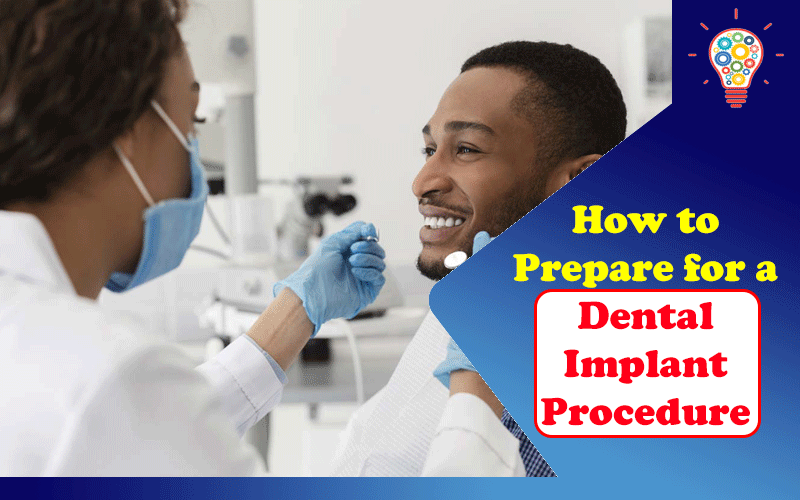Did you know that 5.7% of people had dental implants in 2016? Plus, the number of people getting implants is increasing by 500,000 every year!
Considering that many people are missing at least 1 tooth, it’s easy to see why dental implants are so popular. Not only do they look like real teeth, but they function like them too.
For this reason, you might be interested in this procedure to restore your oral functions. But you might have a bunch of questions surrounding implants.
If you have a dental implant procedure coming up, or if you’re just curious, read on. We’ll show you how you should prepare for it.
Table of Contents
Initial Consultation
If you haven’t even had an initial consultation yet, then you need to book one. The dentist will thoroughly examine your mouth and teeth, as well as get your medical history and take x-rays.
They can then determine if you’re a good candidate for dental implants or not. And if you are, they can decide which types of dental implants are right for you.
From there, they can put together a customized timeline for you to get implants. You should let them know about any allergies at this point so they can source alternatives if needed.
Antibiotics
Before your appointment for dental implants, your dentist might have you take antibiotics. This is especially needed for those who medical issues and/or chronic conditions that might affect their immune system. This includes those who have had medical implants or organ transplants.
If your immune system is poor, you might be more susceptible to infections and implant failure. So as a preemptive measure, you’ll take antibiotics to boost your immune system.
As an additional measure, your dentist might even have you rinse regularly with an antibacterial mouthwash. This can keep your implant site free of bacteria.
Jaw Preparation
The main type of dental implant goes right into your jawbone. However, not everyone has good bone density, which means additional steps need to be taken before the implants are put in.
If this is the case for you, then an oral surgeon might perform a bone graft so your jaw is strong enough to support a dental implant. During this, they might also reshape your jaw.
On the other hand, you might have too large of a jaw. In this case, then the oral surgeon will need to remove some bone from your jaw.
While you’re going through jaw surgery, the oral surgeon will also remove any impacted teeth.
Healing
Should you have to go through the jaw preparation step, then you’ll have to wait to heal before you can get your dental implants. This can take several months. But for those who had minor bone grafting, this can actually be done in the same appointment for your implants, just right before the dentist puts them in.
During this time, you’ll probably have to be on antibiotics to prevent infections from occurring. Not only can this set you back in your implant timeline, but it might create additional problems. So make sure you take your medications as needed.
Fasting
Are you getting general anesthesia (IV sedation) for your dental implant procedure? Then you’ll need to fast for at least 12 hours beforehand.
Otherwise, make sure you eat a good breakfast. This can help you feel less nauseous and dizzy during and after the procedure.
Transportation
Even if you don’t get IV sedation, you probably won’t feel very good after your dental implant procedure. For this reason, you should arrange for transportation both to and from your appointment.
On that note, you shouldn’t expect to resume your normal daily life right after either. Take it easy for that day at least and clear your schedule.
While you might not feel that much pain after your implants, you probably will be uncomfortable. Do yourself a favor and just relax for the rest of the day. This can help your healing process and get you back on your feet quicker.
Food
Before you go in for your appointment, make sure you stock up on soft foods. You might not feel up for grocery shopping, so it’ll be helpful to have easy-to-eat foods already in your home.
Some foods to consider include bread, pudding, yogurt, smoothies, soup. Pasta is also good, if you feel like you can handle it.
Other Tips for After Your Procedure
Soreness and swelling are likely to happen after your procedure, so it can be a good idea to stock up on pain medications as well. That way, you can take them as needed without having to go out and buy them.
You should stop exercising and plan to have a light schedule for at least a week. As for work, you’ll want 2 days off to just relax and recover.
If you have kids to take care of, consider having family or friends take over those duties for at least 2 days. It’s of the utmost importance you don’t stress yourself out, both mentally and physically.
Be Prepared for Your Dental Implant Procedure
If you have an upcoming dental implant procedure, you might be nervous about what’s to come. So we hope this article has given you some peace of mind, as we’ve shown you what needs to be done before the big day.
For those of you who haven’t even scheduled an initial appointment yet, we’d highly suggest you do so. By restoring your smile, speech, and eating capabilities, you’ll have a much better quality of life! It’s also highly recommended to go for a consultation to discuss gum surgery or implant dentist Maywood to find out what works for you.
Did you find this article on the dental implant process helpful? Then read more by browsing our blog page now!

